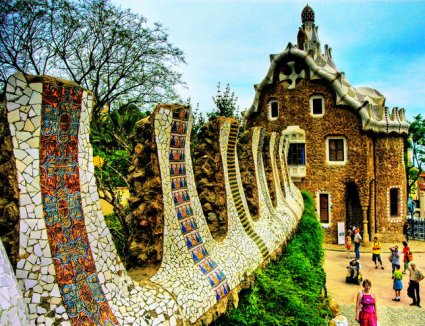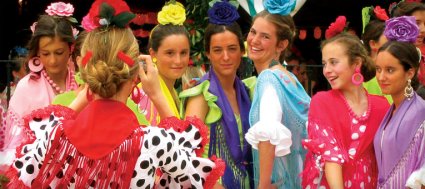Spain
Spain is a diverse country sharing the Iberian Peninsula with Portugal at the western end of the Mediterranean Sea. It is the country with the second-largest number of UNESCO World Heritage Sites, after Italy, and the largest number of World Heritage Cities. Spain is considered an exotic country in Europe due to its friendly inhabitants, relaxed lifestyle, its cuisine, vibrant nightlife, and world-famous folklore and festivities. Among many places worth visiting are Spain's thriving capital Madrid, the vibrant coastal city of Barcelona, the famous "Running of the Bulls" at Pamplona, major Andalusian cities with Islamic architecture, like Seville, Granada and Córdoba, the Way of St. James and the idyllic Balearic and Canary Islands.
With great beaches, fun nightlife, many cultural regions and historic cities, Spain makes a great destination for any kind of trip. A country of large geographic and cultural diversity, Spain is a surprise to those who only know its reputation for great beach holidays. There is everything from lush meadows and snowy mountains to huge marshes and deserts in the south east. While summer is the peak season because of the beaches, those who wish to avoid the crowds should consider visiting in the winter as attractions such as the Alhambra in Granada and La Gran Mezquita in Cordoba will not be overcrowded.
Unsurprisingly, the official and universal language used in Spain is Spanish (español), but it is more complicated than that. It is part of the Romance family of languages (others include Portuguese, Galician, Catalan, Italian, Occitan, French, and Romanian) and is one of the main branches of that family. Many people, especially outside Castille, prefer to call it Castilian (castellano).
However, there are a number of languages (Catalan, Basque, Galician, Asturian, etc.) spoken in various parts of Spain. Some of these languages are dominant in their respective regions, and, following their legalization in the 1978 constitution, they are co-official with Castilian in their respective areas.
Spain is an experience that combines nature and sport, has 2 contrasting landscapes: the mountainous Pyrenees and the Mediterranean Costa Brava, goes off-the-beaten-track places where few tourists and foreigners go, offers delicious inland Catalan food and finishes by with a swim in the Mediterranean and eating Mediterranean food. Green-Ways, also known as Vías Verdes in Spanish, are old railway tracks that have been recovered and reconditioned for walkers and cyclists. They are an awesome way to discover Spain. They are easy to access and since trains once rolled over these paths, there is no So it is a great activity for all ages and fitness levels. There are 1,800 kilometres of Vías Verdes all over Spain.


Spain's Education System
Below Higher Education the system can be seen as consisting of four levels:
- Pre-school (Educación Infantil, segundo ciclo) - 3 to 6 years of age
- Primary School (Educación Primaria) six years of schooling - 6 to 12 years of age
- Compulsory Secondary Education (Educación Secundaria Obligatoria) four years of schooling - 12 to 16 years of age
Post-Compulsory Schooling (Bachillerato) two years of schooling - 16 to 18 years of age
Children 3 to 6 years old in Spain have the option of attending the Pre-school stage (preescolar or popularly known as infantil), which is non-compulsory and free for all students. It is regarded as an integral part of the education system with infants' classes at almost every primary school. There are some separate nursery schools (Colegios Infantiles).
Children (whose parents chose that they should) enter pre-school (Educación Infantil) in the autumn of the calendar year in which they turn three years old. Following this pattern, the ages given here as corresponding to the different phases are the ages turned by children in the calendar year in which the academic year begins. Age ranges are inclusive: 3 to 5 years of age is 3 academic years.
Spanish students aged 6 to 16 undergo primary (colegio) and secondary school (instituto) education, which are compulsory and (like the preceding preschool from age 3) free of charge. Successful students are awarded a Secondary Education Certificate, which is necessary to enter the post-compulsory stage of Schooling (principally theBachillerato) for their University or Vocational (Formación Profesional) Studies. Once students have finished their Bachillerato, they can take their University Entrance Exam (Pruebas de Acceso a la Universidad, popularly called Selectividad) which differs greatly from region to region. The compulsory stage of secondary education is normally referred to by its initials: ESO (Educación Secundaria Obligatoria).
















